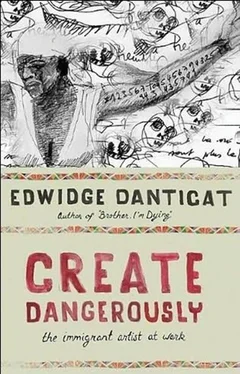Like many a creation myth, aside from its heartrending clash of life and death, homeland and exile, the execution of Marcel Numa and Louis Drouin involves a disobeyed directive from a higher authority and a brutal punishment as a result. If we think back to the biggest creation myth of all, the world’s very first people, Adam and Eve, disobeyed the superior being that fashioned them out of chaos, defying God’s order not to eat what must have been the world’s most desirable apple. Adam and Eve were then banished from Eden, resulting in everything from our having to punch a clock to spending many long, painful hours giving birth.
The order given to Adam and Eve was not to eat the apple. Their ultimate punishment was banishment, exile from paradise. We, the storytellers of the world, ought to be more grateful than most that banishment, rather than execution, was chosen for Adam and Eve, for had they been executed, there would never have been another story told, no stories to pass on.
In his play Caligula , Albert Camus, from whom I borrow part of the title of this essay, has Caligula, the third Roman emperor, declare that it doesn’t matter whether one is exiled or executed, but it is much more important that Caligula has the power to choose. Even before they were executed, Marcel Numa and Louis Drouin had already been exiled. As young men, they had fled Haiti with their parents when Papa Doc Duvalier had come to power in 1957 and had immediately targeted for arrest all his detractors and resistors in the city of poets and elsewhere.
Marcel Numa and Louis Drouin had made new lives for themselves, becoming productive young immigrants in the United States. In addition to his army and finance experience, Louis Drouin was said to have been a good writer and the communications director of Jeune Haiti. In the United States, he contributed to a Haitian political journal called Lambi . Marcel Numa was from a family of writers. One of his male relatives, Nono Numa, had adapted the seventeenth-century French playwright Pierre Corneille’s Le Cid , placing it in a Haitian setting. Many of the young men Numa and Drouin joined with to form Jeune Haiti had had fathers killed by Papa Doc Duvalier, and had returned, Le Cid and Hamlet-like, to revenge them.
Like most creation myths, this one too exists beyond the scope of my own life, yet it still feels present, even urgent. Marcel Numa and Louis Drouin were patriots who died so that other Haitians could live. They were also immigrants, like me. Yet, they had abandoned comfortable lives in the United States and sacrificed themselves for the homeland. One of the first things the despot Duvalier tried to take away from them was the mythic element of their stories. In the propaganda preceding their execution, he labeled them not Haitian, but foreign rebels, good-for-nothing blans .
At the time of the execution of Marcel Numa and Louis Drouin, my recently married, twenty-nine-year-old parents lived in Haiti, in a neighborhood called Bel Air, about a thirty-minute walk from the cemetery. Bel Air had a government-sponsored community center, a centre d’étude , where young men and women-but mostly young men-went to study in the evenings, especially if they had no electricity at home. Some of these young people-not my parents, but young people who studied at the center-belonged to a book club, a reading group sponsored by the Alliance Française, the French Institute. The book group was called Le Club de Bonne Humeur, or the Good Humor Club. At the time, Le Club de Bonne Humeur was reading Camus’ play Caligula with an eye to possibly staging it.
In Camus’ version of Caligula’s life, when Caligula’s sister, who is also his lover, dies, Caligula unleashes his rage and slowly unravels. In a preface to an English translation of the play, Camus wrote, “I look in vain for philosophy in these four acts… I have little regard for an art that deliberately aims to shock because it is unable to convince.”
After the executions of Marcel Numa and Louis Drouin, as the images of their deaths played over and over in cinemas and on state-run television, the young men and women of the Club de Bonne Humeur, along with the rest of Haiti, desperately needed art that could convince. They needed art that could convince them that they would not die the same way Numa and Drouin did. They needed to be convinced that words could still be spoken, that stories could still be told and passed on. So, as my father used to tell it, these young people donned white sheets as togas and they tried to stage Camus’ play-quietly, quietly-in many of their houses, where they whispered lines like:
Execution relieves and liberates. It is a universal tonic, just in precept as in practice. A man dies because he is guilty. A man is guilty because he is one of Caligula’s subjects. Ergo all men are guilty and shall die. It is only a matter of time and patience.
The legend of the underground staging of this and other plays, clandestine readings of pieces of literature, was so strong that years after Papa Doc Duvalier died, every time there was a political murder in Bel Air, one of the young aspiring intellectuals in the neighborhood where I spent the first twelve years of my life might inevitably say that someone should put on a play. And because the uncle who raised me while my parents were in New York for two-thirds of the first twelve years of my life, because that uncle was a minister in Bel Air and had a church and school with some available space, occasionally some of these plays were read and staged, quietly, quietly, in the backyard of his church.
There were many recurrences of this story throughout the country, book and theater clubs secretly cherishing some potentially subversive piece of literature, families burying if not burning their entire libraries, books that might seem innocent but could easily betray them. Novels with the wrong titles. Treatises with the right titles and intentions. Strings of words that, uttered, written, or read, could cause a person’s death. Sometimes these words were written by Haitian writers like Marie Vieux-Chauvet and René Depestre, among others. Other times they were written by foreign or blan writers, writers like Aimé Césaire, Frantz Fanon, or Albert Camus, who were untouchable because they were either not Haitian or already long dead. The fact that death prevented one from being banished-unlike, say, the English novelist Graham Greene, who was banned from Haiti after writing The Comedians -made the “classic” writers all the more appealing. Unlike the country’s own citizens, these writers could neither be tortured or murdered themselves nor cause their family members to be tortured or murdered. And no matter how hard he tried, Papa Doc Duvalier could not make their words go away. Their maxims and phrases would keep coming back, buried deep in memories by the rote recitation techniques that the Haitian school system had taught so well. Because those writers who were still in Haiti, not yet exiled or killed, could not freely perform or print their own words outright, many of them turned, or returned, to the Greeks.
When it was a crime to pick up a bloodied body on the street, Haitian writers introduced Haitian readers to Sophocles’ Oedipus Rex and Antigone , which had been rewritten in Creole and placed in Haitian settings by the playwright Franck Fouché and the poet Felix Morisseau Leroy. This is where these writers placed their bets, striking a dangerous balance between silence and art.
How do writers and readers find each other under such dangerous circumstances? Reading, like writing, under these conditions is disobedience to a directive in which the reader, our Eve, already knows the possible consequences of eating that apple but takes a bold bite anyway.
Читать дальше












